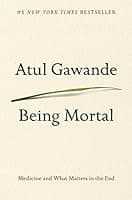
People with serious illness have priorities besides simply prolonging their lives. Surveys find that their top concerns include avoiding suffering, strengthening relationships with family and friends, being mentally aware, not being a burden on others, and achieving a sense that their life is complete.
The job of any doctor, Bludau later told me, is to support quality of life, by which he meant two things: as much freedom from the ravages of disease as possible and the retention of enough function for active engagement in the world.
Studies find that as people grow older they interact with fewer people and concentrate more on spending time with family and established friends. They focus on being rather than doing and on the present more than the future.
Death, of course, is not a failure. Death is normal. Death may be the enemy, but it is also the natural order of things.
When, as the researchers put it, “life’s fragility is primed,” people’s goals and motives in their everyday lives shift completely. It’s perspective, not age, that matters most.
The lesson seems almost Zen: you live longer only when you stop trying to live longer.
So this is the way it unfolds. In the absence of what people like my grandfather could count on—a vast extended family constantly on hand to let him make his own choices—our elderly are left with a controlled and supervised institutional existence, a medically designed answer to unfixable problems, a life designed to be safe but empty of anything they care about.
Courage is strength in the face of knowledge of what is to be feared or hoped. Wisdom is prudent strength.
This is the consequence of a society that faces the final phase of the human life cycle by trying not to think about it. We end up with institutions that address any number of societal goals—from freeing up hospital beds to taking burdens off families’ hands to coping with poverty among the elderly—but never the goal that matters to the people who reside in them: how to make life worth living when we’re weak and frail and can’t fend for ourselves anymore.
What is your understanding of the situation and its potential outcomes? What are your fears and what are your hopes?
Your chances of avoiding the nursing home are directly related to the number of children you have, and, according to what little research has been done, having at least one daughter seems to be crucial to the amount of help you will receive.
People seemed to have two different selves—an experiencing self who endures every moment equally and a remembering self who gives almost all the weight of judgment afterward to two single points in time, the worst moment and the last one.
The veneration of elders may be gone, but not because it has been replaced by veneration of youth. It’s been replaced by veneration of the independent self.
The words you use matter. According to palliative specialists, you shouldn’t say, “I’m sorry things turned out this way,” for example. It can sound like you’re distancing yourself. You should say, “I wish things were different.” You don’t ask, “What do you want when you are dying?” You ask, “If time becomes short, what is most important to you?”
It is not death that the very old tell me they fear. It is what happens short of death—losing their hearing, their memory, their best friends, their way of life. As Felix put it to me, “Old age is a continuous series of losses.” Philip Roth put it more bitterly in his novel Everyman: “Old age is not a battle. Old age is a massacre.”
The only way death is not meaningless is to see yourself as part of something greater: a family, a community, a society.
“Culture has tremendous inertia,” he said. “That’s why it’s culture. It works because it lasts. Culture strangles innovation in the crib.”
We witnessed for ourselves the consequences of living for the best possible day today instead of sacrificing time now for time later.
Medical professionals concentrate on repair of health, not sustenance of the soul.
If you cannot shop for yourself, prepare your own food, maintain your housekeeping, do your laundry, manage your medications, make phone calls, travel on your own, and handle your finances—the eight “Independent Activities of Daily Living”—then you lack the capacity to live safely on your own.